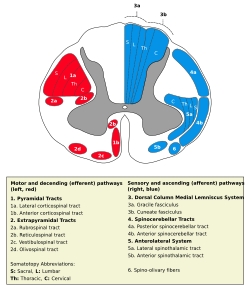Spinal cord
The spinal cord is a bundle of nerves that go to and from the brain. It is enclosed in and protected by the bony vertebral column. The main function of the spinal cord is transmission of neural inputs between the periphery and the brain.
Spinal cord segments
Humans have 31 left-right pairs of spinal nerves, each roughly corresponding to a segment of the vertebral column. The spinal nerve emerges from the spinal column through an opening between adjacent vertebrae. Outside the vertebral column, the nerve divides into branches.
The nerves for incoming sensory information are bundled separately from nerves for outgoing motor instructions for muscles. The system serves the autonomic nervous system as well as the motor activities which we control consciously.
Additional images
Other websites
| Wikimedia Commons has media related to Lua error in Module:Commons_link at line 62: attempt to index field 'wikibase' (a nil value).. |
- Spinal Cord Histology Archived 2006-09-10 at the Wayback Machine - A multitude of great Images from the University of Cincinnati
- Spinal Cord Medical Notes Archived 2008-05-27 at the Wayback Machine - Online medical notes on the Spinal Cord
- eMedicine: Spinal Cord, Topographical and Functional Anatomy
- WebMD. May 17, 2005. Spina Bifida - Topic Overview Archived 2007-03-02 at the Wayback Machine Information about Spina Bifida in fetuses and throughout adulthood. WebMD children's health. Retrieved March 19, 2007.


